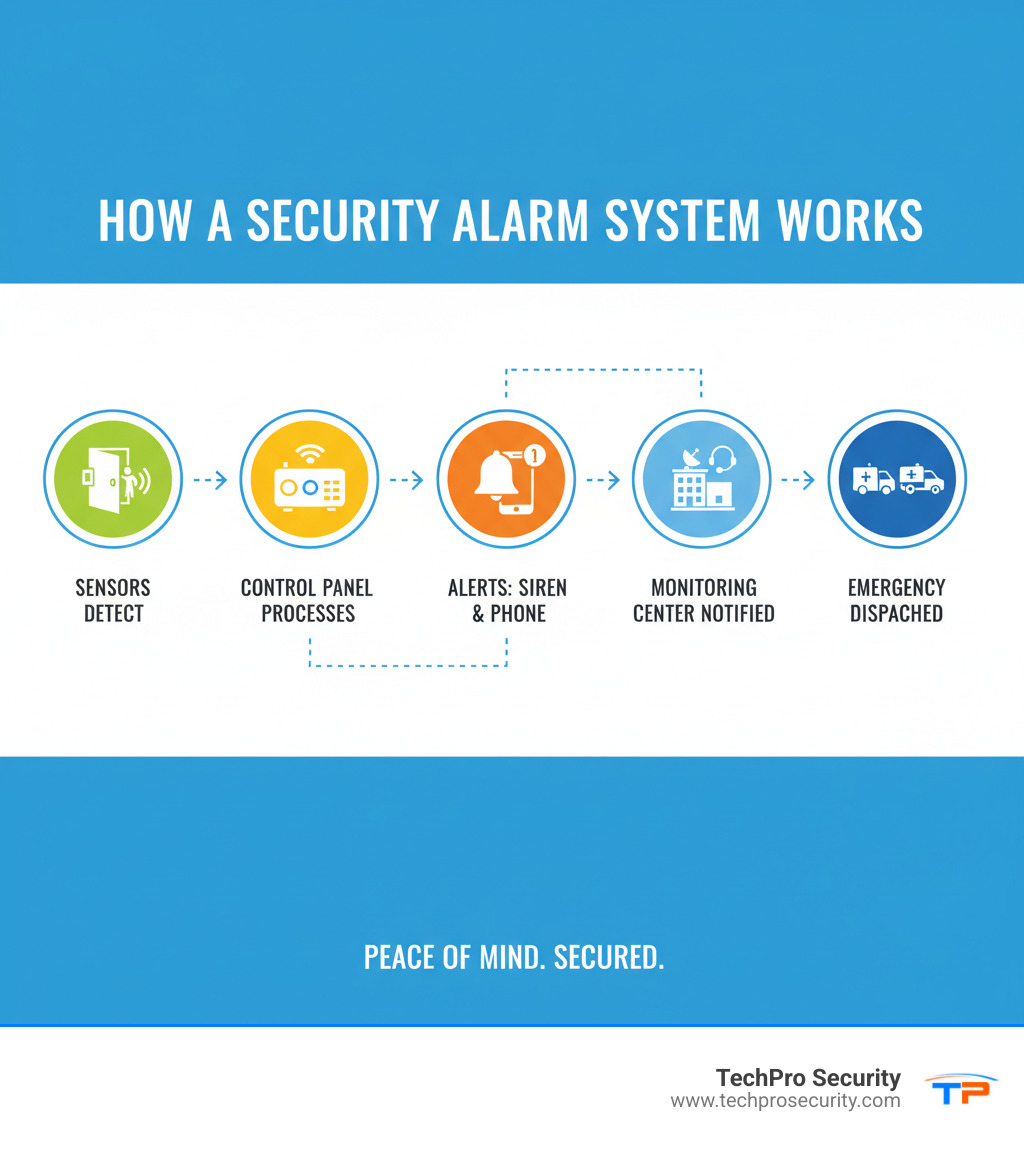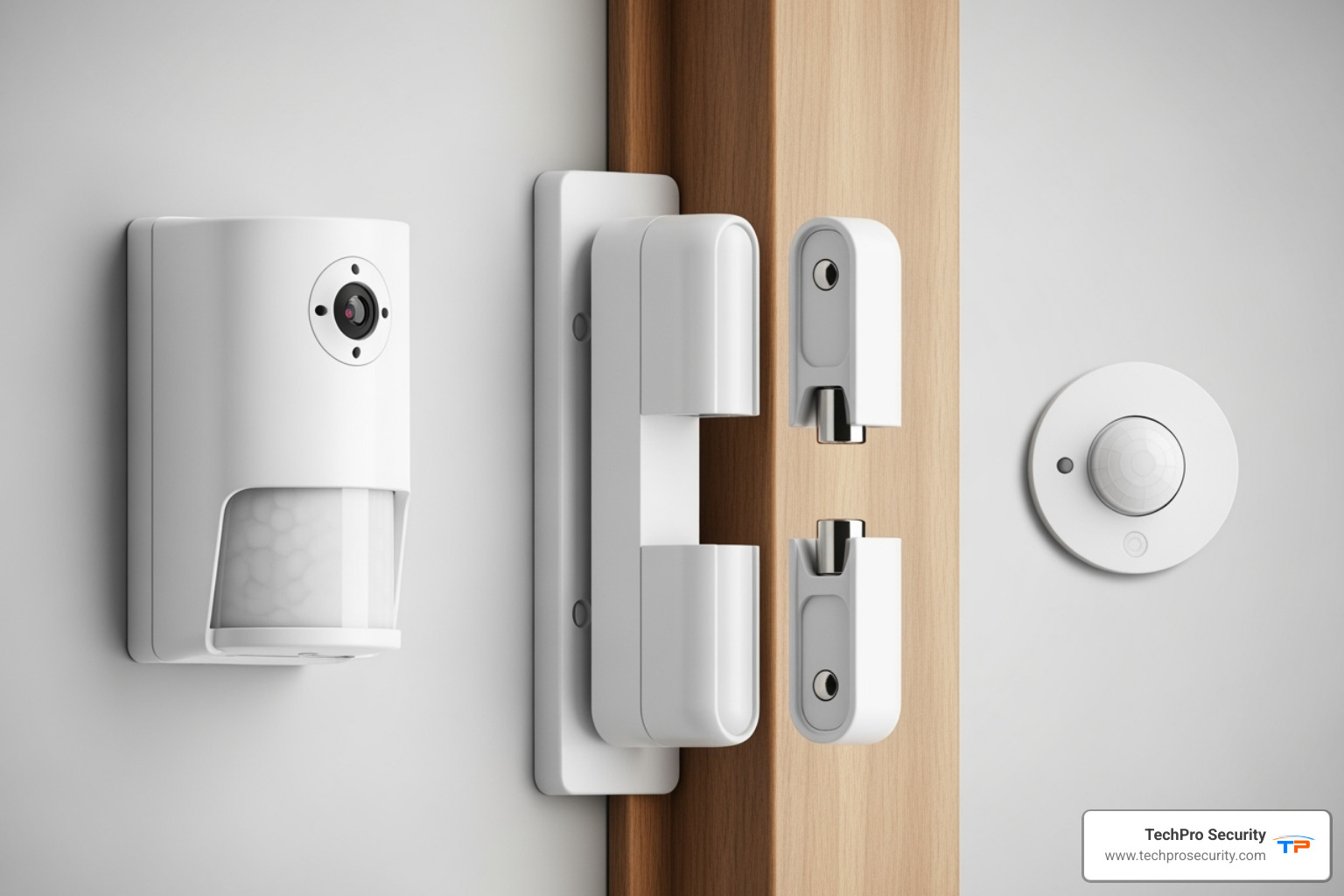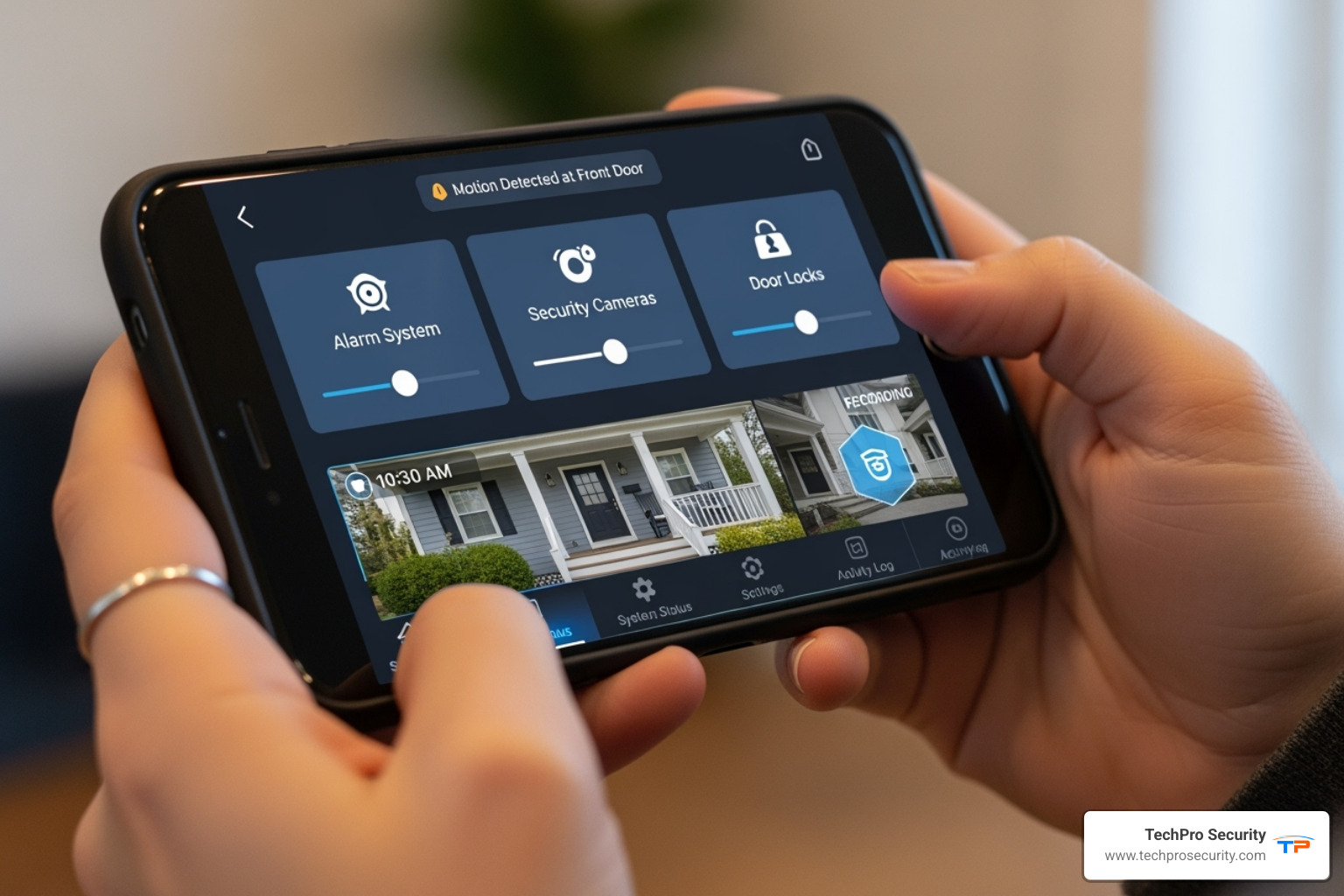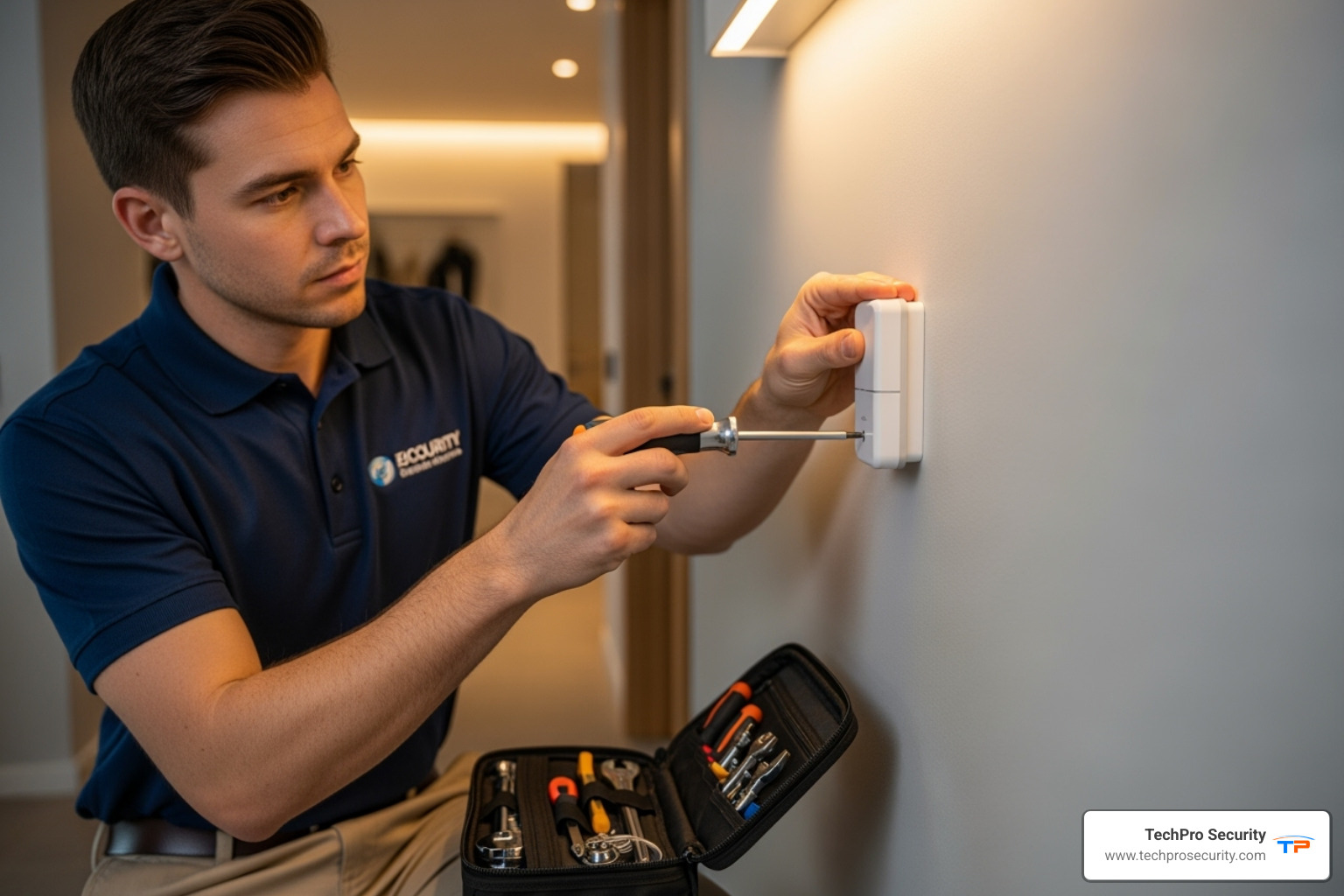Security Alarms: Ultimate 24/7 Home Protection
{“@context”: “https://schema.org”, “@graph”: [{“@type”: “Article”, “headline”: “Security Alarms for Home Protection | TechPro Security”, “description”: “Discover how security alarms offer 24/7 home protection against intrusions, fire, and more. Ensure your safety with TechPro Security today.”, “author”: {“@type”: “Person”, “name”: “Skyler Libkie”}, “publisher”: {“@type”: “Organization”, “name”: “TechPro Security”, “logo”: {“@type”: “ImageObject”, “url”: “https://techprosecurity.com/wp-content/uploads/2024/04/cropped-techpro-fav-192×192.jpg”}}, “datePublished”: “2025-10-27T12:46:16+00:00”, “dateModified”: “2025-10-27T16:46:23.955184”, “mainEntityOfPage”: {“@type”: “WebPage”, “@id”: “https://techprosecurity.com/security-articles/access-control-and-security/security-alarms-complete-guide/”}, “image”: “https://images.bannerbear.com/direct/4mGpW3zwpg0ZK0AxQw/requests/000/107/806/025/NnaW7b28GYDLPVerY4VwORxZl/629cd8a1a52a57dd142f251856af0ded9987b22d.jpg”}, {“@type”: “FAQPage”, “mainEntity”: [{“@type”: “Question”, “name”: “Why are security alarms essential for home protection?”, “acceptedAnswer”: {“@type”: “Answer”, “text”: “Security alarms are essential for home protection because they deter criminals, detect intrusions, fires, or environmental hazards, alert homeowners and a monitoring center, and facilitate a rapid response by dispatching emergency services.”}}, {“@type”: “Question”, “name”: “What functions do security alarms serve?”, “acceptedAnswer”: {“@type”: “Answer”, “text”: “Security alarms serve to deter potential intruders, detect unauthorized entry or environmental dangers, alert homeowners and monitoring centers, and enable a swift response by dispatching emergency services.”}}, {“@type”: “Question”, “name”: “How do modern security alarms work?”, “acceptedAnswer”: {“@type”: “Answer”, “text”: “Modern security alarms work by using sensors connected to a central control panel that triggers alerts and notifies a 24/7 monitoring center when a threat is detected, enabling the center to contact emergency services.”}}, {“@type”: “Question”, “name”: “What types of hazards can comprehensive security alarms protect against?”, “acceptedAnswer”: {“@type”: “Answer”, “text”: “Comprehensive security alarms can protect against break-ins, fires, carbon monoxide, flooding, and other environmental hazards.”}}, {“@type”: “Question”, “name”: “What are the benefits of integrating security alarms with smart home technology?”, “acceptedAnswer”: {“@type”: “Answer”, “text”: “Integrating security alarms with smart home technology offers benefits such as remote control of the system via mobile apps, enhancing convenience and allowing homeowners to monitor their property from anywhere.”}}]}]}
Why Security Alarms Are Essential for Your Home’s Protection
Security alarms are systems designed to detect threats like unauthorized entry, fire, or environmental hazards. They serve several key functions:
- Deterrence: Visible systems make your property a less attractive target for criminals.
- Detection: Sensors on doors, windows, and inside rooms detect intrusions, smoke, carbon monoxide, and more.
- Alerts: When a sensor is triggered, the system sounds a loud siren, sends notifications to your phone, and alerts a professional monitoring center.
- Response: The monitoring center can dispatch police, fire, or medical services on your behalf.
With over 2.5 million home intrusions reported annually in the U.S. and an average property loss of $5,944 per burglary, a security system is a crucial investment. Modern security alarms also offer smart home integration for remote control via mobile apps.
The system works by connecting sensors to a central control panel. When a sensor detects a threat, it signals the panel, which triggers the alerts and notifies a 24/7 monitoring center. These trained professionals can immediately contact emergency services, providing invaluable peace of mind.
I’m Brad Besner, founder of TechPro Security Products. Since 2007, we’ve specialized in custom-designed security alarm systems for homes and businesses across South Florida, successfully preventing hundreds of crimes.

Understanding the Different Types of Security Alarms
Modern security alarms protect against much more than just break-ins. A comprehensive system can guard against fires, carbon monoxide, flooding, and other hazards. Understanding the different types of protection is the first step to building a system that fits your needs.

Intrusion Alarms (Burglar Alarms)
Intrusion alarms are your front-line defense against unauthorized entry, using sensors at vulnerable points around your property.
- Door and window sensors detect when an entry point is opened while the system is armed.
- Motion sensors use passive infrared technology to detect movement and heat signatures in larger areas. Modern sensors can distinguish between pets and people to reduce false alarms.
- Glass break sensors listen for the specific frequency of shattering glass.
- Shock sensors detect vibrations from forced entry attempts, like kicking a door or prying a window.
When any of these sensors are tripped, the system sounds a siren and sends an alert to our monitoring center to dispatch law enforcement if necessary.
Fire Alarms
Early fire detection can be the difference between minor damage and a total loss. We integrate fire protection as a standard feature in our security alarms.
- Smoke detectors, particularly photoelectric models, are best for detecting the smoldering fires that produce deadly smoke.
- Heat detectors are ideal for kitchens and garages, as they respond to rapid temperature spikes without being triggered by normal smoke or fumes.
Monitored fire alarms ensure the fire department is contacted immediately, even if you’re not home, saving precious minutes that can protect lives and property.
Environmental Alarms (CO, Water Leak, and More)
Environmental sensors protect you from silent threats.
- Carbon monoxide (CO) detectors are essential for detecting this invisible, odorless, and deadly gas.
- Water leak sensors, placed near water heaters, washing machines, or in basements, can alert you to leaks before they cause thousands in damage.
- Gas detection alarms monitor for natural gas or propane leaks, preventing potential explosions.
- Temperature sensors warn of extreme cold that could freeze pipes or extreme heat from a failed HVAC system, which is especially useful for unattended properties.
More info about our Security Systems
Wired vs. Wireless Systems
Choosing between a wired or wireless security alarm system is a key decision. Both are effective, but they suit different situations.
Wired systems connect components to the control panel via low-voltage wiring.
- Pros: Extremely reliable, no sensor batteries to replace, and equipment can be less expensive.
- Cons: Installation is more invasive and labor-intensive, making it best suited for new construction or major renovations.
Wireless systems use radio signals to communicate between components.
- Pros: Fast, minimally disruptive installation perfect for existing homes. They are flexible, allowing for easy addition or relocation of sensors.
- Cons: Sensors run on batteries that require periodic replacement (though they last for years and the system provides advance warnings).
Modern wireless technology is highly reliable. In South Florida, we often install wireless systems for their flexibility and performance, but we recommend the best approach for each unique property after a thorough consultation.
Key Components and Features to Look For
Modern security alarms are sophisticated hubs for your smart home, offering features that provide convenience, control, and improved protection. Features like smart home integration, remote access, mobile app control, and AI-powered detection transform a basic alarm into an intelligent security ecosystem.

These features allow you to see who is at your door, speak to them, and control your system from anywhere, making your home safer and your life easier.
The Core of Your System: Essential Security Alarm Components
Every effective security alarm is built on a foundation of core components working in unison.
- Alarm Control Panel (PCU): The brain of the system, it processes signals from all sensors and determines the response, such as sounding an alarm or contacting the monitoring center.
- Sensors: These are the eyes and ears of your system. They include door and window sensors, motion sensors, glass break sensors, and environmental sensors for smoke, CO, and water.
- Keypads and Key Fobs: Keypads, typically near entry points, allow you to arm and disarm the system with a code. Key fobs offer convenient one-touch control.
- Sirens: Loud indoor and outdoor sirens startle intruders and alert neighbors to a problem.
- Alerting Devices: In the event of an alarm, the system sends instant push notifications, texts, or emails to you and our 24/7 monitoring center.
More info about Access Control Security Systems
Expanding Your View: The Role of Cameras and Video Doorbells
Adding cameras and video doorbells provides a critical visual layer to your security alarms.
- Video Verification: Cameras provide our monitoring center with immediate visual confirmation of an alarm, helping verify a real emergency and often leading to faster police response.
- Remote Viewing: Check live footage from your property anytime through a smartphone app, giving you peace of mind whether you’re at the office or on vacation.
- Video Doorbells: These are perfect for monitoring your front porch. Features like package detection can alert you to deliveries and help deter theft.
- Two-Way Audio: Available on most cameras and doorbells, this feature lets you communicate with visitors, delivery people, or intruders from anywhere.
- Deterrence: The mere presence of visible cameras and video doorbells makes criminals think twice. Many outdoor cameras also include motion-activated spotlights and sirens to proactively scare off lurkers.
More info about Home Security Systems
The Future is Now: Smart Home Integration and Advanced Features
Modern security alarms can serve as the central hub of your smart home, making it more secure and efficient.
- Voice Assistants: Use simple voice commands with Alexa or Google to arm your system, check its status, or view camera feeds.
- Automation Rules: Create rules that link your security system to other smart devices. For example, arming the system can automatically lock doors, turn off lights, and adjust the thermostat. In an emergency, it can shut off airflow to contain a fire.
- Geofencing: Your system can use your phone’s location to automatically arm when you leave and disarm when you return, adding a layer of seamless convenience.
- AI-Powered Detection: Advanced AI can differentiate between people, animals, and vehicles, dramatically reducing false alarms. It can also detect suspicious loitering and trigger deterrents like lights and sirens to prevent a crime before it happens.
We integrate the latest security innovations, informed by research like studies on burglary prevention, to design systems that proactively deter crime.
More info about Smart Home Installation
Installation and Monitoring: Making the Right Choice
Choosing the right security alarm system is only half the battle; professional installation and monitoring are what make it truly effective. Even the best hardware can fail if it’s not installed and monitored correctly.

Professional Security Alarm Installation
While DIY installation may seem tempting, professional installation ensures your system provides reliable protection, not a false sense of security.
Our experienced technicians bring years of training to every job. They understand optimal sensor placement to eliminate blind spots and know how to integrate all components seamlessly. We design custom solutions custom to your property’s unique challenges, from specific architectural features in South Florida homes to your personal security concerns.
With a professional installation of your security alarms, you also receive our extensive warranties and free US-based support. The peace of mind from knowing your system is installed correctly by experts is invaluable.
More info about Security Alarm Installation Services
24/7 Professional Alarm Monitoring
An unmonitored alarm just makes noise. 24/7 professional monitoring turns your system into a comprehensive protection service that works even when you’re asleep, away from home, or without cell service.
Our UL-Approved, 5-Diamond Certified CSAA Central Station is staffed around the clock by trained professionals. When your security alarm triggers, they receive an immediate signal and spring into action.
This rapid response is critical. Our operators will first try to contact you. If they can’t, or if it’s a confirmed emergency, they will immediately dispatch police, fire, or medical personnel. This process can save lives and prevent catastrophic property damage in the event of a fire or break-in.
Professional monitoring provides profound peace of mind and may also qualify you for insurance discounts of up to 20 percent. It is an essential component of any truly effective security alarm system.
More info about Home Alarm Monitoring Services in Pompano Beach
The True Cost of Security Alarms
Understanding the cost of security alarms is a key part of making an informed decision. The total investment includes equipment, installation, and monthly monitoring.
Equipment Costs
The initial investment is for the hardware. A basic package might include a control panel, a few door/window sensors, and a motion detector. However, most properties benefit from a customized system with additional cameras, a video doorbell, or environmental sensors custom to your specific layout and security needs. At TechPro Security, we design systems that provide the right level of protection without unnecessary extras.
Installation Fees
Professional installation ensures your security alarms are set up correctly for maximum effectiveness. The fee covers the expertise of our technicians and varies based on system complexity, property size, and whether it’s a wired or wireless setup. We provide clear, upfront estimates with no hidden costs.
Monthly Monitoring Fees
This recurring fee connects your system to our UL-Approved, 5-Diamond Certified CSAA Central Station for 24/7 protection. The fee, typically ranging from $20 to $60 per month, covers continuous professional oversight, emergency dispatch, and cellular backup to keep you connected. The price depends on the level of service, from basic intrusion detection to comprehensive fire, CO, and smart home monitoring.
More info about Alarm Monitoring Services Prices
Hidden Costs and Potential Savings
Be aware of a few additional factors and potential benefits:
- Alarm Permits: Many cities, including those in South Florida, require an annual permit for security alarms, typically costing $25-$100. Information on alarm permits can clarify local requirements.
- False Alarm Fines: Municipalities may fine you for repeated false alarms, though proper professional installation and training make these rare.
- Insurance Discounts: Most insurance providers offer discounts of up to 20 percent on homeowner’s insurance for professionally monitored systems, which can significantly offset monitoring costs over time.
- Energy Savings: Smart home integrations, like automated thermostats and lighting, can lead to lower energy bills.
The cost of security alarms is an investment in the safety of your family, the protection of your property, and your peace of mind.
Frequently Asked Questions about Security Alarms
Over our years of installing and monitoring security alarms in South Florida, we’ve found that clients often have the same key questions. Here are the answers to the most common ones.
Are home security systems worth the money?
Yes, absolutely. A security system is a valuable investment for several reasons:
- Deterrence: Studies show that homes with visible security systems are far less likely to be targeted by burglars.
- Financial Protection: The average loss from a burglary is nearly $6,000. A security system costs a fraction of that potential loss.
- Insurance Savings: A professionally monitored security alarm can reduce your homeowner’s insurance premiums by up to 20%.
- Comprehensive Safety: Systems protect against more than theft; they provide life-saving warnings for fire, carbon monoxide, and other environmental dangers.
- Peace of Mind: Knowing your home and family are protected 24/7, whether you are home or away, is the most significant benefit.
Should I get a hardwired or wireless security system?
Both systems provide excellent protection, but the best choice depends on your home.
- Hardwired systems are extremely reliable and have no sensor batteries to change. They are best for new construction or homes undergoing major renovation due to the invasive installation process.
- Wireless systems offer fast, flexible installation with minimal disruption, making them ideal for existing homes. Modern wireless technology is highly secure and reliable, though sensors require periodic battery changes.
We will recommend the best option for your property during our consultation.
How do smart home integrations improve my security alarm?
Integrating your security alarm with smart home devices makes your home safer and more convenient. It turns your alarm into the central hub of your home’s technology.
- Automation: Create rules to have your lights, locks, and thermostat react automatically when you arm or disarm your system. For example, locking all doors when you arm the system at night.
- Remote Control: Use a single smartphone app to manage your security, cameras, locks, and lights from anywhere in the world.
- Voice Control: Use voice commands with Amazon Alexa or Google Assistant for hands-free control of your system.
This centralized control simplifies managing your home’s security and adds a powerful layer of convenience and responsiveness.
More info about Smart Home Installation
Conclusion
Choosing the right security alarm comes down to finding a solution that fits your specific needs and provides genuine peace of mind. A truly effective system is one that has been thoughtfully designed for your unique property, professionally installed, and properly monitored.
Professional installation ensures every sensor is placed for optimal coverage, while 24/7 professional monitoring guarantees that trained experts are ready to dispatch emergency services the moment a threat is detected. These are not optional extras—they are essential for a system that works when you need it most.
At TechPro Security, we’ve been designing custom security alarms for South Florida homes and businesses since 2007. Our experienced team provides reliable solutions backed by extensive warranties and free US-based support. We don’t just sell equipment; we deliver security you can count on.
Don’t leave your family’s safety to chance. Whether you need protection from break-ins, fire, or environmental hazards, we are here to help you design the right system.

